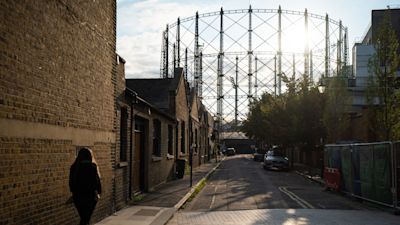Explainer
Why are gas prices continuing to rise and how will the crisis affect your bills?

What is the price cap rise and how will it impact you? ITV News Political Correspondent Libby Wiener explains
Energy bills for households across the UK could rise by £400 by next summer.
The news comes less than a week after prices rose by £139 at the start of October as the new winter price cap came into force.
The price hikes have been caused by the soaring cost of wholesale gas which in turn has made the price cap promise to customers undeliverable for some companies, causing nine to fold since the start of the year.
But why have gas prices fluctuated so wildly and how will any increase affect your bills?
Why has there been a rise in gas prices?
A global shortage of gas has increased prices around the world, with demand rising as economies emerge from the Covid-19 pandemic.
The last winter was a long and cold one across Europe and Asia, increasing demand for heating and leaving gas stocks depleted.
It was followed by a calm summer with less wind than normal, meaning countries have been less able to rely on renewable energy. The rise in costs has also been attributed to refineries in the US being shut down as a result of Category 4 Hurricane Ida.
Why have UK gas prices been affected by Russia?
High demand for liquefied natural gas from Asia and a reduction in supplies from Russia have also been blamed for the price rise.
On Wednesday, UK wholesale gas prices hit a record high before falling after Russia confirmed that it was boosting supplies to Europe.
Gas prices had risen by 37% in 24 hours to trade at 400p per therm (the energy equivalent of burning 100 cubic feet of gas) - up from UK gas being at 60p per therm at the start of the year.
But Vladimir Putin's comments calmed markets, with gas prices dropping to around 257p a therm later on Wednesday.
Is the UK particularly susceptible to gas price rises?
The UK is more vulnerable to rising gas prices than many other countries as it is more reliant on natural gas to heat homes. The UK also has less storage capacity after the government allowed a plant which stored three-quarters of the country’s natural gas to be shut down.
What effect does the gas price surge have on energy companies?
In recent weeks, nine energy suppliers have gone under, meaning more than 1.7 million customers are dependent on the safety net provided by the market regulator, Ofgem.
Enstroga, Symbio and Igloo were the latest energy suppliers to go under.
These companies have been mostly smaller firms, which have been unable to deliver price promises to consumers due to the surge in gas prices meaning they cannot afford to keep operating with the energy price cap in place.
Affected customers have been told they will be moved to a new tariff by Ofgem and be contacted by their new supplier.
How do energy suppliers work in the UK?
Supplying energy to homes involves three steps: generating the electricity, transporting the gas and electricity and selling it to customers. Energy companies can work in any of these stages.
In the UK, private companies ensure we have the electricity and gas markets that we need.
Electricity is generated in power stations, which are run by private companies.
After this, it is transported through the electricity network run by National Grid.
Suppliers buy energy in the wholesale market and sell it on to customers.
What will the rise mean for your energy bill?
Jonathan Brearley, the boss of Ofgem, has warned that the cost of protecting customers from failing energy providers could push up energy bills.
Research agency Cornwall Insight has predicted further volatile gas prices and the potential collapse of even more suppliers could push the energy price cap to about £1,660 in summer, almost £400 higher than the £1,277 price cap set for winter 2021-22. This would be an increase of 30%. Regulator Ofgem reviews the price cap once every six months, and changes it based on the cost suppliers have to pay for their energy, cost of policies and operating costs, among other things.
Many energy customers are locked into year-long deals which will fix their price for the 12 months of the contract.
If your contract is coming to an end shortly you will probably have to change to a more expensive deal.
If you are struggling to pay your bills, call them in the first instance or visit the Energy UK website for information.
What protection does the energy price cap give consumers?
A higher energy price cap came into effect from October 1.
It means that people on standard tariffs - with typical household levels of energy use - will see bills rise by £139 to £1,277 a year.
The energy price cap is meant to protect consumers through sudden spikes in gas prices by setting maximum prices for people on a standard or default tariff.
The increase has been driven by a rise of more than 50% in energy costs over the last six months.
The latest cap, announced in August, was determined before further unprecedented increases in global prices.
But, the next revision of the cap, which will affect bills from the start of April, is predicted to significantly increase to mirror the rising costs faced by suppliers.